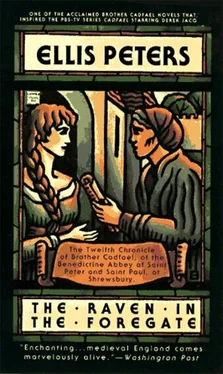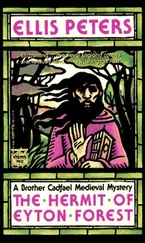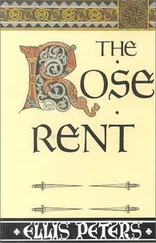They rose together, and unwound the cloak from about them, drawing in breath sharply at the invading cold.
“You haven’t told me,” said Ninian, opening the heavy door on the comparative light outside, “just what thought brought you here tonight—though I’m glad it did. I was not happy at leaving you without a word. But you can hardly have been hunting for me! What were you hoping to find?”
“I wish I knew. This morning I found a gaggle of goslings playing in the snow with a black skull-cap that surely belonged to Ailnoth, for the boys had found it here in the shallows of the pool, among the reeds. And I had seen him wearing it that evening, and clean forgotten so small a thing. And it’s been nagging at me all day long since then that there was something else I had noted about him, and likewise never missed and never looked for afterwards. I don’t know that I came here with any great expectation of finding anything. Perhaps I simply hoped that being here might bring the thing back to mind. Did ever you get up to do something, and then clean forget what it was?” wondered Cadfael. “And have to go back to where you first thought of it, to bring it back to mind? No, surely not, you’re too young, for you to think of doing a thing is to do it. But ask the elders like me, they’ll all admit to it.”
“And it still hasn’t come back to you?” asked Ninian, delicately sympathetic towards the old and forgetful.
“It has not. Not even here. Have you fared any better?”
“It was a thin hope to find what I came for,” said Ninian ruefully,”though I did risk coming before the light was quite gone. But at least I know what I came looking for. I was there with Diota when you brought him back on Christmas Day, and I never thought what was missing until later. After all, it’s a thing that could well go astray, not like the clothes he was wearing. But I knew he had it with him when he came stamping along the path and stabbing at the ground. Coming all this way through England in his company, I got to know it very well. That great staff he was always so lungeous with—ebony, tall as his elbow, with a stag’s-horn handle—that’s what I came to look for. And somewhere here it must still be.”
They had emerged on to the low shore, dappled now with moist dark patches of grass breaking through the tattered snow. The dull, pale level of the water stretched away to the dark slope of the further bank. Cadfael had stopped abruptly, staring over the shield of pallor in startled enlightenment.
“So it must!” he said devoutly. “So it must! Child, that’s the will-o’-the-wisp I’ve been chasing all this day. You get back to your refuge and keep snug within, and leave this search to me now. You’ve read my riddle for me.”
By morning half the snow had melted and vanished, and the Foregate was like a coil of tattered and threadbare lace. The cobbles of the great court shone moist and dark, and in the graveyard east of the church Cynric had broken the turf for Father Ailnoth’s grave.
Cadfael came from the last chapter of the year with a strong feeling that more things than the year were ending. No word had yet been said of who was to succeed to the living of Holy Cross, no word would be said until Ailnoth was safely under the ground, with every proper rite and as much mourning as brotherhood and parish could muster between them. The next day, the birth of another year, would see the burial of a brief tyranny that would soon be gratefully forgotten. God send us, thought Cadfael, a humble soul who thinks himself as fallible as his flock, and labours modestly to keep both from falling. If two hold fast together they stand steadily, but if one holds aloof the other may find his feet betraying him in slippery places. Better a limping prop than a solid rock for ever out of reach of the stretched hand.
Cadfael made for the wicket in the wall, and went through to the shores of the mill-pond. He stood on the edge of the overhanging bank between the pollarded willows, at the spot where he had found Ailnoth’s body, the pool widening and shallowing on his right hand into the reed beds below the highway, and on his left gradually narrowing to the deeper stream that carried the water back to the brook, and shortly thereafter to the Severn. The body had entered the water probably a few yards to the right, and been nudged aside here under the bank by the tail-race. The skull-cap had been found in the reeds, somewhere accessible from the path on the opposite side. A small, light thing, it would go with the current until reeds or branch or debris in the water arrested it. But where would a heavy ebony staff be carried, whether it flew from his hand as he was struck down, or whether it was thrown in after him, from this spot? It would either be drifted aside in the same direction as the body, in which case it might be sunk deep somewhere in the narrowing channel, or else, if it fell on the other side of the main force of the tail-race, edged away like the skull-cap into the far shore. At least there was no harm in circling the shallow bowl and looking for it.
He re-crossed the little bridge over the head-race, circled the mill and went down to the edge of the water. There was no real path here, the gardens of the three small houses came almost to the lip of the bank, where a narrow strip of open grass just allowed of passage. For some way the path was still raised above water level, and somewhat hollowed out beneath, then it dropped gradually into the first growth of reeds, and he walked in tufted grass, with moisture welling round every step he took. Under the miller’s house and garden, under the house where the deaf old woman lived with her pretty slattern of a maidservant, and then he was bearing somewhat away from the final house, round the rim of the broad shallows. Silver of water gleamed through the blanched, pallid green of winter reeds, but though an accumulation of leaves, dead twigs and branches had drifted and lodged here, he saw no sign of an ebony walking-staff. Other cast-offs, however, showed themselves, broken crockery, discarded shards and a holed pot, too far gone to be worth mending.
He went on, round the broad end of the pool, to the trickle of water that came down from the conduit under the highway, stepped over that, and on beneath the gardens of the second trio of abbey houses. Somewhere here the boys had found the cap, but he could not believe he would find the staff here. Either he had missed it, or, if it had been flung well out over the drift of the tail-race, he must look for it on the far side of the channel opposite where the body had been found. The water was still fairly wide there, but what fell beyond its centre might well fetch up on this far side.
He halted to consider, glad he had put on boots to wade about this thawing quagmire. His friend and fellow Welshman, Madog of the Dead Boat, who knew everything there was to be known about water and its properties, given an idea of the thing sought, could have told him exactly where to seek it. But Madog was not here, and time was precious, and he must manage on his own. Ebony was heavy and solid, but still it was wood, and would float. Nor would it float evenly, having a stag’s-horn handle, a tip should break the surface, wherever it lodged, and he did not believe it would be carried so far as the brook and the river. Doggedly he went on, and on this side of the water there was a trodden path, which gradually lifted out of the boggy ground, and carried him dry-shod a little above the surface of the pool.
He drew level with the mill opposite, and was past the sloping strips of garden on this side the water. The stunted willow stump, defiantly sprouting its head of startled hair, matched his progress and held his eye. Just beyond that the body had lain, nuzzling the undercut bank.
Читать дальше












